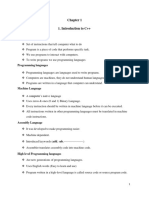0% found this document useful (0 votes)
51 views4 pagesC++ Notes Styled
This document provides comprehensive notes on C++ programming, covering topics from basic syntax to advanced concepts. It includes sections on data types, control structures, functions, object-oriented programming, and the Standard Template Library (STL). Additionally, it touches on advanced topics such as lambda functions and multithreading.
Uploaded by
ayushxd911Copyright
© © All Rights Reserved
We take content rights seriously. If you suspect this is your content, claim it here.
Available Formats
Download as PDF, TXT or read online on Scribd
0% found this document useful (0 votes)
51 views4 pagesC++ Notes Styled
This document provides comprehensive notes on C++ programming, covering topics from basic syntax to advanced concepts. It includes sections on data types, control structures, functions, object-oriented programming, and the Standard Template Library (STL). Additionally, it touches on advanced topics such as lambda functions and multithreading.
Uploaded by
ayushxd911Copyright
© © All Rights Reserved
We take content rights seriously. If you suspect this is your content, claim it here.
Available Formats
Download as PDF, TXT or read online on Scribd
/ 4

















































